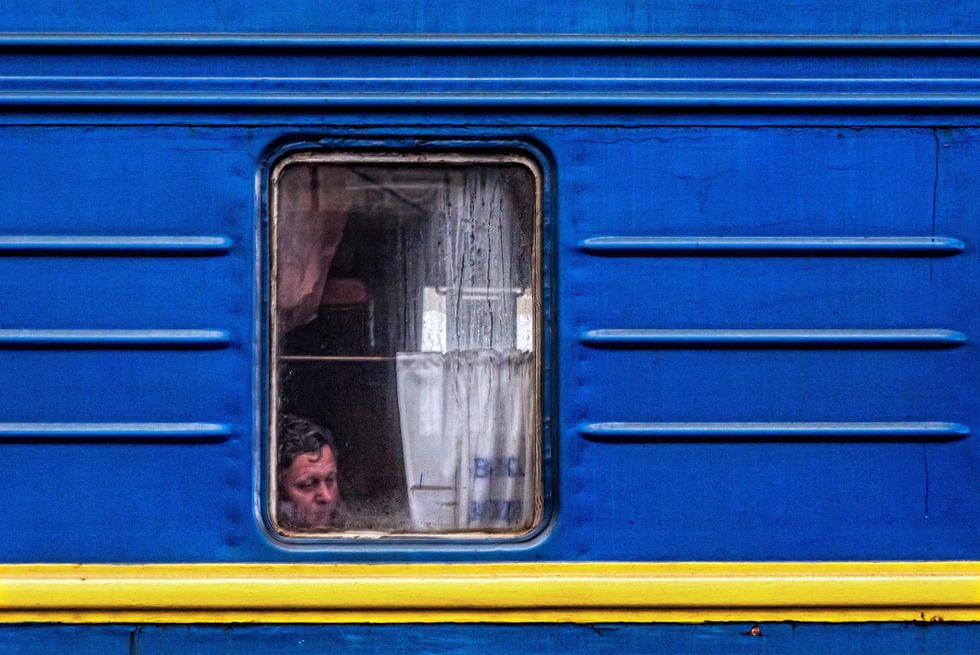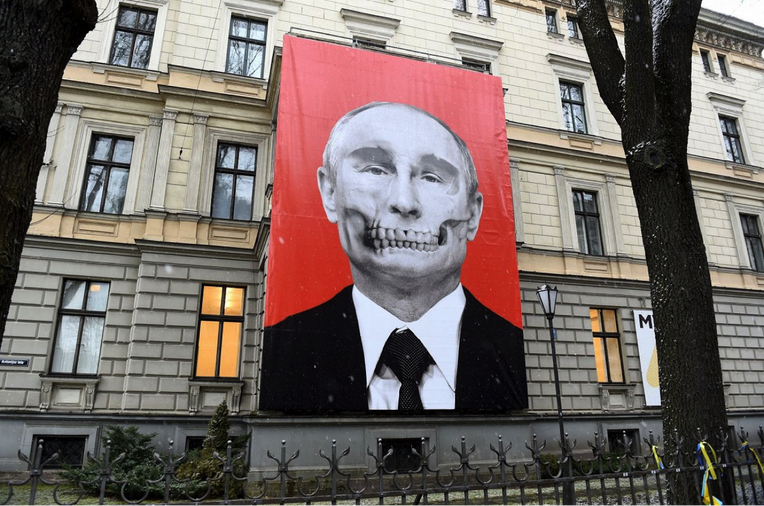Radical Sovereignty
From the Series: Russia’s War in Ukraine, Continued
From the Series: Russia’s War in Ukraine, Continued

My Lithuanian great-grandfather whistled Russian songs from his time as a recruit in the army of the Russian Empire during the First World War. Another great-grandfather disappeared into the black holes of the Gulag system during the Second World War. One grandfather survived WWII but died soon after, leaving the family with the shadow of a murder by the KGB. Another grandfather, when still a high school student, was sent to Siberian labor camps. The history of occupations is inscribed in almost every family in Ukraine. They resound in the whistling notes of empire. “Warfare,” as Margaret Mead succinctly argued in 1940, “is an invention like any other of the inventions in terms of which we order our lives” (1990). In recent decades, occupations of sovereign countries seemed to be an invention of the past—in Europe, at least—until the bombs started landing in Kyiv, Kharkiv, Kherson, Mariupol . . . putting an end to Europe’s invention of peaceful coexistence.
Since 2014, the former Western Soviet periphery states—Ukraine, Lithuania, Latvia, and Estonia—have been consolidated as radical sovereignty regimes. Radical sovereignties are sites of radical politics where national unity supersedes individual interests, rights of a particular group are prioritized over others, patriotism and militarism define the everyday. Ukrainian radical sovereignty in the current moment is exceptional in its egalitarianism, when soldiers, presidents, scientists, and workers, men and women, old and young take guns to fight the occupational forces. When Jewish people were locked in ghettos during WWII, they created theater shows and art, poems, and jokes inside that brutal reality. The Ukrainian warscape is a creative aesthetic space, too: slogans like “Russian warship, go fuck yourself” and billboards telling occupiers to go home or to go to The Hague populate the landscape. People tell jokes about how Ukrainian villagers secretly put Ukrainian flags on Russian tanks to be blown up by other Russian tanks, how Ukrainian farmers tow away Russian tanks with their tractors, or how an old lady downs a Russian drone with a jar of tomatoes. It is a time of celebrated hatred against enemies that does not conflict with human rights. The Lithuanian Human Rights Center assures citizens that calling Putin a chuilo (dick) is not an instigation of hatred per the Republic of Lithuania Criminal Code. The values of democracy, freedom, multiculturalism, liberalism, and the rule of law are superfluous in the context of war. When the war will be over, radical politics will continue for decades to come because the dead will live among us; those who were buried, who were unburied, and who were unborn. We will go to sleep and wake up with them; go shopping for bread passing by the shelled bakery and giving our respect to the thirteen killed bakers; or cradle unborn or dead children in our arms. Those who survived will whistle the notes of liberation.
The war in Ukraine epitomizes twenty years of the politics of historical revisionism associated with Putin’s regime. This politics has been defined by a return to authoritarian governance, including centralization of power, censorship and media control, state-sponsored propaganda, anti-Western ideology, militarism, and expansive territorial domination. The former Soviet Western periphery countries like Ukraine were declared “failed states,” “Western puppets,” and a “threat to Russia.” From cyberattacks to fake news, accusations of fascism and neo-Nazism, the sovereignty of these countries has been undermined to emphasize their illegitimacy. Even before the war in Ukraine these states responded in radical ways, legitimizing and protecting their sovereignty. Unlike the United Nations Convention definition of “genocide,” the Lithuanian Criminal Code, for example, states that genocide can be carried out against “any social or political group” in addition to national, ethnic, racial, or religious groups, and recognizes “Soviet genocide.” The Criminal Code also criminalizes public approval of crimes committed by the USSR or Nazi Germany against the state or its residents, as well as denying or grossly diminishing such crimes. After the occupation of Crimea in 2014, Lithuanian President Dalia Grybauskaitė called Russia a “terrorist state.” Ukraine’s attempts to join the EU and NATO have been strategies to securitize their regime as well.
The USSR and Russia never admitted to war crimes and crimes against humanity during and in the aftermath of WWII. The WWII victors had the right to say who was a victim and who was a perpetrator. The Soviet army in occupied territories such as the Baltics protected the Soviet version of history and silenced others by threatening people, sending them to the Gulag, and executing them. In the last twenty years, the Russian Federation has turned history into a powerful propaganda tool protected by law. The 2021 Russian Federation law prohibits public comparison between the roles and actions of Nazi Germany and the Soviet Union during WWII. It denies the atrocities of the Bolshevik regime and Stalinism. As in Soviet times, this Russian regime protects the state and its elites from the state’s victims (cf. Koposov 2017); it devalues human rights and human life.
Baltic history teaches us that only war can stop war. The Baltic state governments did not resist in 1940 and allowed the Soviets to install communist puppet governments. According to Lithuanian historian Arvydas Anušauskas, Soviet “genocide and terror victims” numbered about 500,000 (2012, 280), roughly one fifth of Lithuania’s population. It was then when my Lithuanian great-grandfather and grandfather were taken to the Gulag and another grandfather was most likely murdered by the KGB. The rest of the population lived under the authoritarian regime for almost half a century. I wish that my orphaned mother had never heard the whistle of that Russian song . . . and did not have to live with the disappeared and murdered. And that I would have never known about it.
Russia’s war against Ukraine redraws borders, terrorizes a population into submission, and fosters radical resistance. It is a war against many other peoples, too, including Russians. It requires conscripts born in 2002 and 2003 to fight in Ukraine; some will return home in portable crematorium boxes or be declared lost in action. In just twenty days, as I write, this war has resulted in hunger, mass graves, Russian soldiers devoured by dogs, civilian bodies blown up, and the terror of exile and separation. The frontiers of war have expanded deep into Europe, now flooded by exiles and populated with military equipment and humanitarian trucks. Although the Russian Federation has claimed Ukraine to be the cradle of Russian nationhood, Ukraine is, in fact, the cradle of a new Europe.

Anušauskas, Arvydas 2012. Teroras 1940–1958 m. Vilnius: Versus Aureus.
Koposov, Nikolay. 2017. “Defending Stalinism by Means of Criminal Law: Russia, 1995–2014.” In Law and Memory: Towards Legal Governance of History, edited by Aleksandra Gliszczyńska-Grabias and Uladzislau Belavusau, 293–309. Cambridge: Cambridge University Press.
Mead, Margaret. 1990. “Warfare Is Only an Invention—Not a Biological Necessity.” In The Dolphin Reader, edited by Douglas Hunt, 415–21. Boston: Houghton Mifflin.